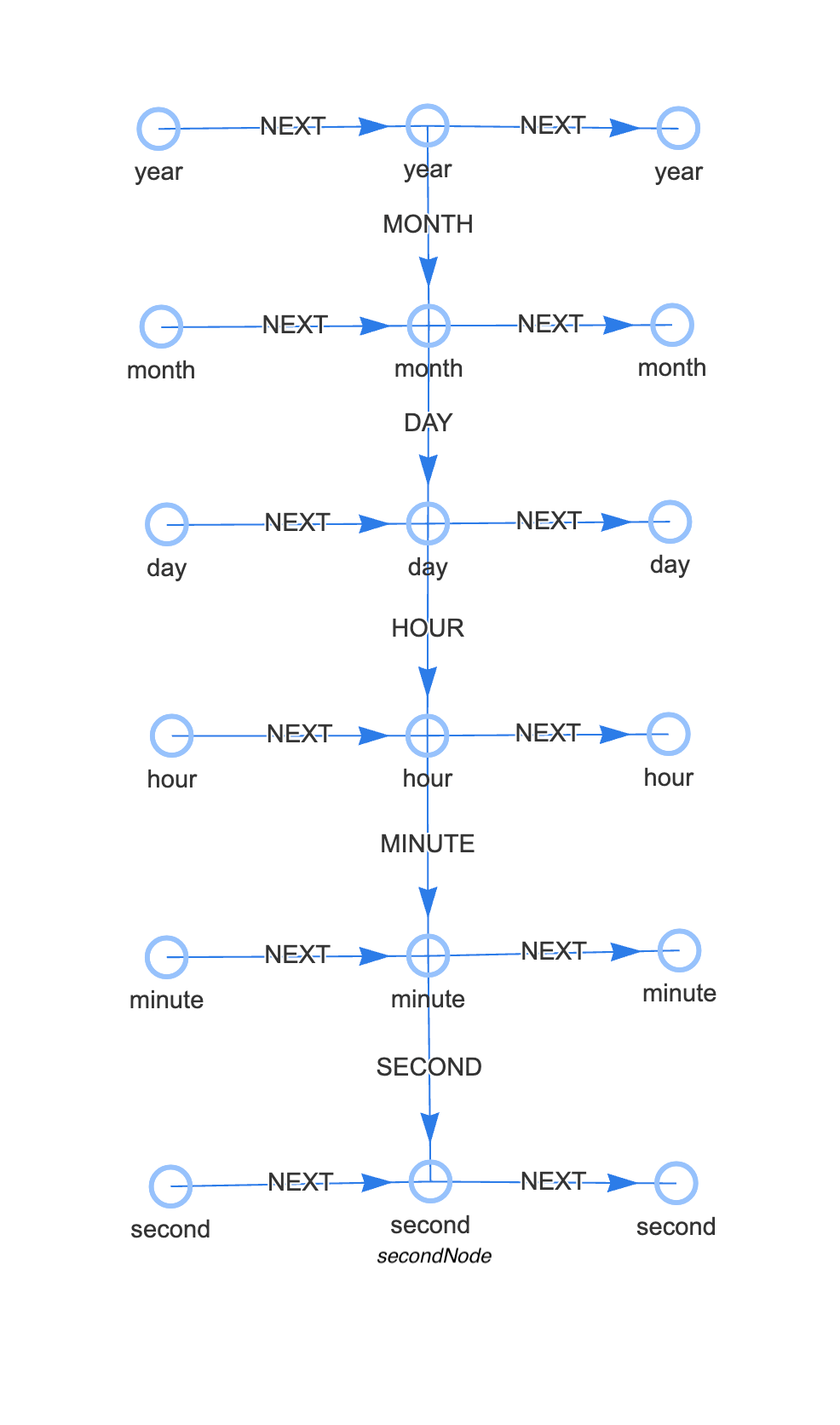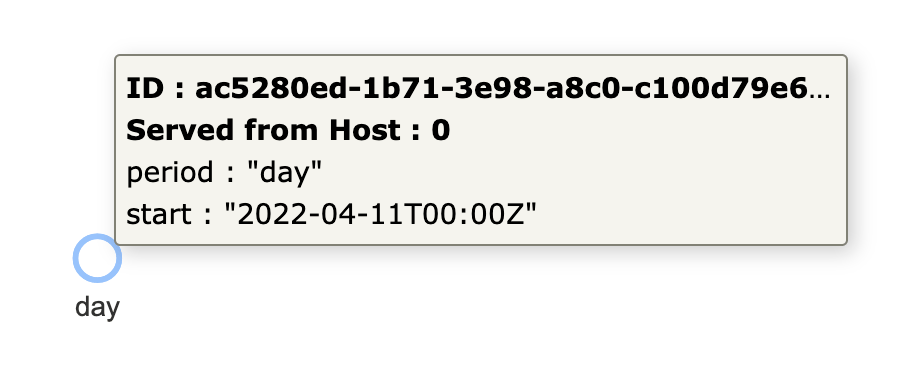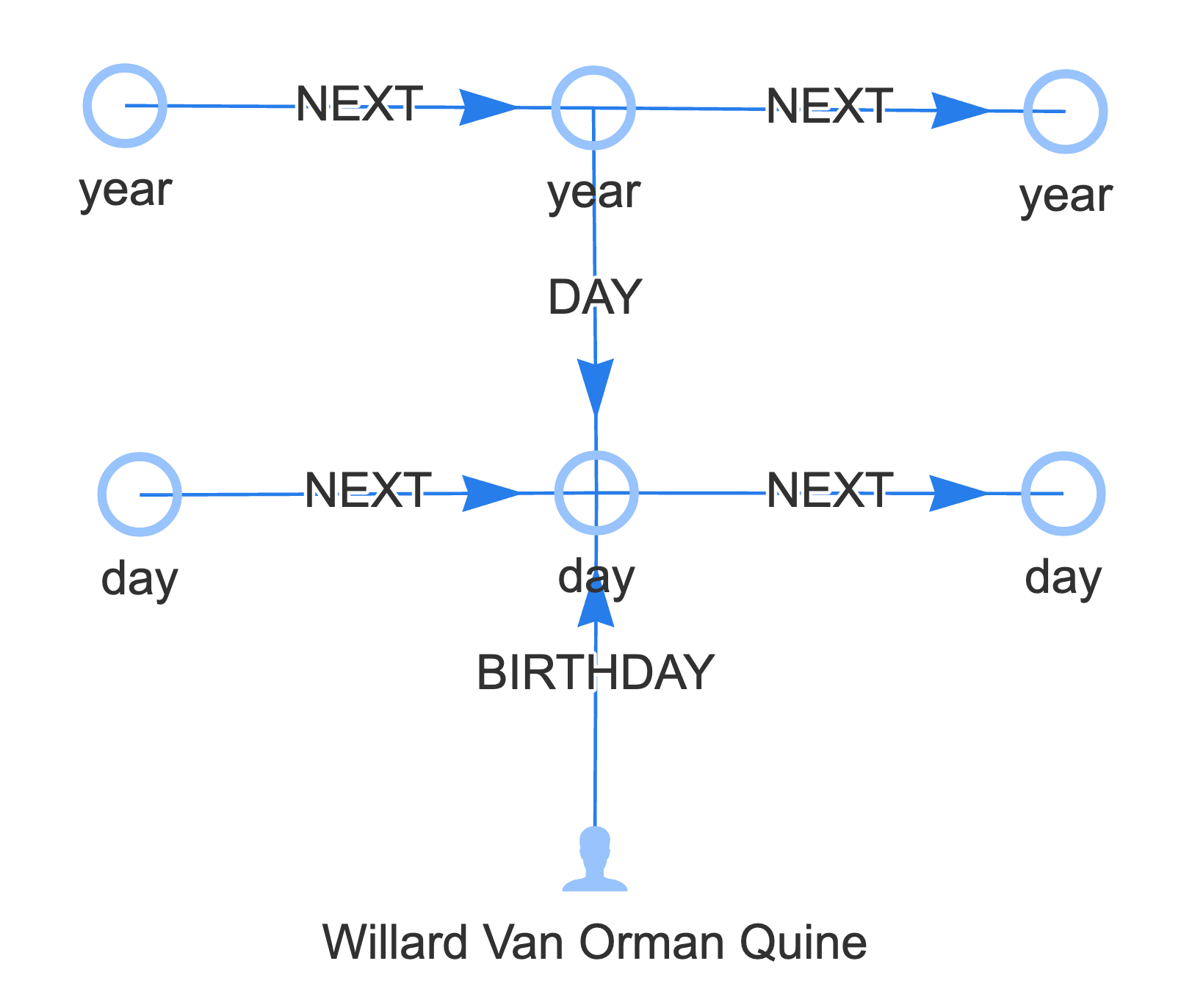Time Reification¶
reify.time is a Cypher procedure included with Quine. Its purpose is to facilitate the instantiation (reification) of
a graph of nodes representing time. reify.time is provided with a timestamp (current wall clock time as the default),
and a list of time periods. It adds time nodes representing that point in time at each period's level of precision.
It returns the node representing that point in time for the smallest among the given periods. reify.time does this by
determining which nodes must exist, and either reading them from the graph or creating them as necessary. Additionally,
reify.time relates the nodes it makes to each other and other nodes previously created by this function.
reify.time does not do anything Cypher can't do. In this sense, reify.time is unnecessary. So why does it need to exist?
- To reduce the boilerplate necessary to ingest time-series data usefully
- To create a modification point where in the future, changes can be made to how time-series data is modeled in the graph and have this change applied to all usages
- To organize data to be more useful in the Quine web UI
- To settle on a unified convention for representing time so that users don’t have to spend brainpower to create something bespoke (and inconsistent among different users)
- To create the persistent graph structure upon which time-series aggregate values can be stored or related
reify.time builds a hierarchy of related nodes for a single datetime value. Each node in this hierarchy represents a different period where the input datetime value belongs.
- Each node in the hierarchy is defined by a start datetime value and a period.
- Each node in the hierarchy is related to its parent node (except the largest).
- Each node in the hierarchy is also related to the next node in time (and the same period).
If you want to find a node created by reify.time in a later query, call it again with the datetime and the period of
the node you want.
Supported Parameters¶
- ZonedDateTime (optional; defaults to now)
- Periods (optional list of strings; defaults to all periods)
Periods are:
- year
- month
- day
- hour
- minute
- second
Return Values¶
reify.time returns the smallest period time node reified by this function. This function creates time nodes that do not exist and reuses time nodes that already exist.
Examples¶
Call reify.time with default arguments, which will be to reify time nodes at all periods for the current system clock time:
CALL reify.time() YIELD node AS secondNode RETURN secondNode
Run with a time parsed from a string:
CALL reify.time(datetime("2022-04-11T11:06:12Z"), ["month", "day"]) YIELD node AS dayNode RETURN dayNode
Reify Willard Van Orman Quine's birthday at the year and day level, then create a node representing Quine himself with an edge to his birthday at the day level. Match the adjacent nodes created at all levels by reify.time to return everything created by this query.
CALL reify.time(datetime("1908-06-25T08:27:42-05:00"), ["year", "day"]) YIELD node AS dayNode
MATCH (q)
WHERE id(q) = idFrom("Quine")
SET q:Person, q.name = 'Willard Van Orman Quine'
CREATE (q)-[:BIRTHDAY]->(dayNode)
WITH dayNode AS birthday
MATCH
(quine)-[:BIRTHDAY]->(birthday)<-[:DAY]-(birthyear {period: 'year'}),
(previousYear)-[:NEXT]->(birthyear)-[:NEXT]->(nextYear),
(previousDay)-[:NEXT]->(birthday)-[:NEXT]->(nextDay)
RETURN quine, previousYear, birthyear, nextYear, previousDay, birthday, nextDay
Use within a Recipe:
version: 1
title: Ingest Wikipedia Page Create stream
contributor: https://github.com/landon9720
summary: Consume events about new Wikipedia pages to build a time series reified graph
description: |-
Wikipedia page creation events are instantiated in the graph with relationships to a reified time model.
Additionally, page creation event comments are echoed to standard output.
Data source documentation: https://stream.wikimedia.org/?doc#/streams/get_v2_stream_page_create
ingestStreams:
- type: ServerSentEventsIngest
url: https://stream.wikimedia.org/v2/stream/page-create
format:
type: CypherJson
query: |-
MATCH (revNode), (dbNode), (userNode)
WHERE id(revNode) = idFrom("revision", $that.rev_id)
AND id(dbNode) = idFrom("db", $that.database)
AND id(userNode) = idFrom("id", $that.performer.user_id)
// Set labels for nodes //
CALL create.setLabels(revNode, ["rev:" + $that.page_title])
CALL create.setLabels(dbNode, ["db:" + $that.database])
CALL create.setLabels(userNode, ["user:" + $that.performer.user_text])
// Create timeNode node to provide day/hour/minute bucketing and counting of revNodes //
CALL reify.time(datetime($that.rev_timestamp), ["year", "month", "day", "hour", "minute", "second"]) YIELD node AS timeNode
CALL incrementCounter(timeNode, "count", 1) YIELD count AS timeNodeCount
// Set properties for nodes //
SET revNode = $that,
revNode.type = "rev"
SET dbNode.database = $that.database,
dbNode.type = "db"
SET userNode = $that.performer,
userNode.type = "user"
// Create edges between nodes //
CREATE (revNode)-[:DB]->(dbNode),
(revNode)-[:BY]->(userNode),
(revNode)-[:AT]->(timeNode)
standingQueries:
- pattern:
type: Cypher
query: |-
MATCH (n)
WHERE n.comment IS NOT NULL
RETURN DISTINCT id(n) AS id
outputs:
output-1:
type: CypherQuery
query: |-
MATCH (n)
WHERE id(n) = $that.data.id
RETURN n.comment AS line
andThen:
type: PrintToStandardOut
nodeAppearances: []
quickQueries: []
sampleQueries:
- name: Show time nodes
query: >
MATCH (n)
WHERE n.period IS NOT NULL
RETURN n
- name: Show revision nodes
query: >
MATCH (n)
WHERE n.type = "rev"
RETURN n
- name: Show database nodes
query: >
MATCH (n)
WHERE n.type = "db"
RETURN n
- name: Show user nodes
query: >
MATCH (n)
WHERE n.type = "user"
RETURN n
The above Recipe consumes an event stream that describes new Wikipedia pages. Each event includes a timestamp, which is passed to reify.time.


